
Journal of the Association for Information Systems
Scope & Guideline
Empowering Minds Through Information Systems Scholarship
Introduction
Aims and Scopes
- Interdisciplinary Research:
JAIS promotes interdisciplinary studies that draw from fields such as computer science, sociology, psychology, and economics, encouraging a holistic view of information systems. - User-Centered Design:
The journal emphasizes the importance of human factors in technology design and implementation, focusing on user experience, usability, and the socio-technical aspects of information systems. - Digital Transformation and Innovation:
Research on digital transformation is a core area, exploring how organizations leverage technology for innovation, competitive advantage, and organizational change. - Data-Driven Decision Making:
JAIS publishes studies that investigate the role of data analytics and big data in shaping business strategies, operational efficiencies, and decision-making processes. - Ethics and Social Impact:
The journal addresses the ethical implications and societal impacts of information technologies, focusing on privacy, security, and the responsible use of AI and data. - Emerging Technologies:
Papers often explore the implications of new technologies such as AI, machine learning, and blockchain, analyzing their potential to disrupt traditional business models and practices.
Trending and Emerging
- Artificial Intelligence and Machine Learning:
There is a marked increase in research investigating the applications of AI and machine learning across various sectors, focusing on their implications for decision-making, automation, and ethical considerations. - Human-AI Collaboration:
Emerging studies explore the dynamics of collaboration between humans and AI systems, emphasizing the need for understanding how these interactions can enhance productivity and creativity. - Digital Resilience and Sustainability:
As organizations face increasing disruptions, research on digital resilience and sustainability is gaining attention, focusing on how technology can support sustainable practices and recovery strategies. - Social Media and Digital Activism:
The journal has seen a rise in research exploring the role of social media in facilitating digital activism and its impact on social movements, emphasizing the intersection of technology and social change. - Cybersecurity and Information Assurance:
With the rise of cyber threats, there is an increasing focus on cybersecurity practices, information assurance, and the socio-technical dimensions of security in information systems. - Ethical AI and Governance:
Research on the ethical implications of AI technologies and the governance frameworks necessary to manage their deployment is becoming increasingly prevalent, reflecting societal concerns about accountability and transparency.
Declining or Waning
- Traditional IT Infrastructure Research:
Research centered on conventional IT infrastructure and management practices has seen a decline, as the focus shifts towards cloud computing, digital platforms, and agile methodologies. - Static Models of User Behavior:
Studies relying on static models of user behavior are becoming less frequent, with a growing preference for dynamic and context-sensitive approaches that account for changing user interactions with technology. - Legacy Systems and Maintenance:
Research focusing on legacy systems and their maintenance has waned, as organizations increasingly transition to cloud services and modern IT solutions. - Narrow Focus on Technical Skills:
There is a declining emphasis on purely technical skills in information systems education, with a broader focus now encompassing soft skills, interdisciplinary collaboration, and strategic thinking. - Overemphasis on Quantitative Methods:
The journal has seen a shift away from exclusively quantitative research methodologies, as qualitative and mixed-methods approaches gain traction for their ability to provide deeper insights into complex phenomena.
Similar Journals
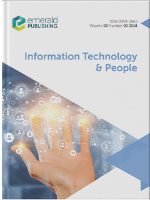
Information Technology & People
Pioneering studies that shape the future of IT and human behavior.Information Technology & People is a renowned academic journal published by Emerald Group Publishing Ltd, dedicated to advancing insights in the intersection of technology, organizational context, and human behavior. Established in 1990, the journal has extensively contributed to the field of Computer Science Applications, Information Systems, and Library and Information Sciences, reflecting top-tier research as evidenced by its Q1 quartile ranking in 2023 across these categories. With a notable Scopus ranking, including a percentile of 91st in Library and Information Sciences, it serves as an essential resource for researchers, professionals, and students eager to explore contemporary issues and innovations in the deployment and impact of information technology on society. While not operating under an open access model, the journal provides a gateway to pivotal studies and findings that shape the future of IT and its implications for people and organizations. Located in the United Kingdom, Information Technology & People continues to be a vital platform for disseminating cutting-edge research that bridges the gap between technology and human experience.

Acta Informatica Pragensia
Advancing Insights: Where Computer Science Meets Information Systems.Acta Informatica Pragensia is a prominent open access journal published by UNIV ECONOMICS, PRAGUE, which has been dedicated to advancing the fields of Computer Science Applications, Information Systems, Library and Information Sciences, and Management Information Systems since its inception in 2012. Situated in the beautiful Czech Republic, this journal aims to foster academic dialogue and disseminate high-quality research across these interdisciplinary domains. With an H-index indicating its growing impact, Acta Informatica Pragensia offers authors the opportunity to publish their findings in a Q4 ranked journal within significant categories according to the 2023 metrics, including a notable Q3 in Library and Information Sciences. Its placement in the Scopus ranks also showcases its relevance in the field, including a solid position in the 58th percentile for Library and Information Sciences. The journal's open access model ensures that research is widely available, empowering students, researchers, and professionals to engage with the latest innovations and trends. Submissions from diverse backgrounds are welcomed, making it an essential resource for those seeking to contribute to the evolution of information technology and systems.
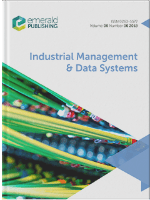
INDUSTRIAL MANAGEMENT & DATA SYSTEMS
Unlocking Potential with Advanced Research in Industrial SystemsINDUSTRIAL MANAGEMENT & DATA SYSTEMS is a leading academic journal published by Emerald Group Publishing Ltd, focusing on the intersection of industrial management and data analytics. With a strong reputation in multiple fields—including Computer Science Applications, Industrial and Manufacturing Engineering, Industrial Relations, Management Information Systems, and Strategy and Management—the journal has attained an impressive Q1 status in 2023 across these categories, emphasizing its critical role in advancing knowledge within these domains. The journal's extensive history, dating back to 1980 and converging through 2024, reflects its commitment to disseminating cutting-edge research that empowers professionals and researchers alike. No Open Access option is available, but it remains an essential resource for those involved in industrial management and data systems, as evidenced by its strong rankings in Scopus. By publishing high-quality articles that address emerging challenges and innovations, INDUSTRIAL MANAGEMENT & DATA SYSTEMS continues to shape the future landscape of its field, making it a valuable asset for dedicated scholars and practitioners.
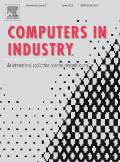
COMPUTERS IN INDUSTRY
Connecting technology and industry for a smarter future.COMPUTERS IN INDUSTRY is a premier journal published by Elsevier, dedicated to the exploration and advancement of the intersection between technology and industrial applications. With a history spanning from 1979 to 2024, this high-impact journal holds prestigious Q1 rankings in both Computer Science and Engineering, showcasing its significant contribution to the fields of general engineering and computer science. Notably, it ranks #4 out of 307 journals and #9 out of 232 journals in their respective categories on Scopus, placing it in the top 2% of publications worldwide. Although it is not an Open Access journal, it continues to serve as a vital resource for researchers, professionals, and students seeking in-depth insights and innovative research findings in industrial computing. The journal’s objective is to publish high-quality, peer-reviewed articles that advance the understanding and application of computer systems in industrial environments, reaffirming its crucial role in driving technological progress and operational efficiency.
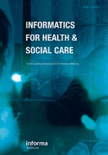
Informatics for Health & Social Care
Empowering social care with cutting-edge data solutions.Informatics for Health & Social Care is a leading journal published by Taylor & Francis Inc, dedicated to the intersection of health informatics and social care. With a strong emphasis on advancing knowledge in the fields of health information management and nursing, this journal has established itself as a vital resource for researchers and professionals seeking to explore innovative applications of informatics to improve patient outcomes and streamline healthcare delivery. Recognized for its influential contributions, it currently holds a Q2 ranking in both Health Informatics and Health Information Management, as well as a prestigious Q1 ranking in Nursing (miscellaneous) for 2023, signifying its critical role within the academic community. The journal is accessible for open access viewing, fostering a broader dissemination of research findings. Released continuously since 1976, it stands as a testament to the evolving landscape of health informatics, addressing pertinent issues and facilitating discussions that shape practices in health and social care delivery.
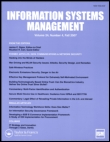
INFORMATION SYSTEMS MANAGEMENT
Elevating Research in Information Systems ManagementINFORMATION SYSTEMS MANAGEMENT is a premier academic journal published by Taylor & Francis Inc, focusing on the ever-evolving fields of Information Systems, Computer Science Applications, and Library and Information Sciences. With an impressive track record spanning over three decades since its inception in 1992, this journal is recognized in the top quartile (Q1) of its categories as of 2023, reflecting its influence and contribution to the research community. The journal holds commendable rankings in Scopus, positioned at #6 out of 280 in Library and Information Sciences, #44 out of 817 in Computer Science Applications, and #23 out of 394 in Information Systems, all showcasing its esteemed standing among peers. While the journal is not open access, it remains a vital resource for researchers, professionals, and students seeking to enhance their understanding of information systems management through high-quality, peer-reviewed articles that illuminate current trends, innovative technologies, and theoretical advancements in the field. With its dedicated commitment to scholarly excellence, INFORMATION SYSTEMS MANAGEMENT continues to be a leading platform for fostering knowledge dissemination and promoting academic dialogue.

KSII Transactions on Internet and Information Systems
Unveiling Insights in the Evolving Digital Landscape.KSII Transactions on Internet and Information Systems is a leading academic journal dedicated to advancing the fields of Internet technology and information systems. Published by the KSII-Kor Soc Internet Information, this journal has established itself as a significant contributor to research since its inception in 2007, with a focus on innovative solutions and methodologies in computer networks and communications as well as information systems. With a Category Quartile of Q3 in both fields for 2023, it ranks in the 44th percentile among its peers according to Scopus, making it a reputable platform for authors to share their findings. While available in print, the journal also promotes open access, ensuring broad dissemination of research findings. The editorial team is committed to maintaining high scholarly standards and relevance, inviting contributions from researchers, professionals, and students eager to push the boundaries of knowledge in today's rapidly evolving digital landscape. For those engaged in or studying these dynamic fields, the KSII Transactions on Internet and Information Systems remains an invaluable resource for cutting-edge research.

Human-centric Computing and Information Sciences
Bridging Technology and Humanity for a Smarter FutureHuman-centric Computing and Information Sciences, published by the Korea Information Processing Society, represents a leading platform in the field of computer science, particularly focusing on the interaction between humans and computational systems. With an impressive Q1 ranking in the 2023 category of Computer Science (miscellaneous) and a commendable Scopus rank of #14/232 (94th percentile), this journal has established itself as a cornerstone for researchers and practitioners dedicated to advancing understanding in this vital area. Understanding the significance of making technology more accessible and effective for users, the journal has been an Open Access publication since 2011, promoting wide dissemination of knowledge without barriers. The journal's scope encompasses innovative methodologies, user experience design, and the integration of human factors into computing environments, making it essential reading for anyone interested in the intersection of technology and society. With all articles freely accessible, the journal not only contributes to scholarly discourse but also encourages collaboration among researchers worldwide, fostering further advancements in human-centric computing.

INFORMATION SYSTEMS FRONTIERS
Illuminating the Frontiers of Information Systems KnowledgeINFORMATION SYSTEMS FRONTIERS, published by Springer, stands at the forefront of interdisciplinary research in the fields of Computer Networks, Information Systems, Software Engineering, and Theoretical Computer Science. Since its inception in 1999, the journal has established itself as a highly regarded source of innovative research, reflected in its impressive Q1 status across multiple categories as of 2023, indicating a prominent position in the academic landscape. With a dedicated focus on disseminating cutting-edge findings and fostering a better understanding of complex information systems, this journal serves as an essential platform for researchers, professionals, and students alike. Authors benefit from a rigorous peer-review process, while readers gain access to pivotal advancements that drive the evolution of technology and information processing. Located in the Netherlands, the journal is poised to continue shaping the discourse in information systems until its converged years of 2024 and beyond.

Ethics and Information Technology
Bridging Technology and Morality for a Better TomorrowEthics and Information Technology, published by Springer, stands as a pivotal journal in the interdisciplinary field that bridges technology with ethical considerations. With an ISSN of 1388-1957 and an E-ISSN of 1572-8439, this journal serves as a key resource for scholars exploring the complex dynamics between information technology and ethical implications, helping to shape the discourse around privacy, cybersecurity, and digital governance. Ranking in the top quartile of both Computer Science Applications and Library and Information Sciences, the journal has attained impressive Scopus rankings, placing it at #25 out of 280 in Social Sciences and #156 out of 817 in Computer Science. This high standing reflects its significant impact and relevance in contemporary research, as well as its invaluable contribution towards fostering a responsible use of technology. Researchers, professionals, and students can benefit from its comprehensive studies and cutting-edge findings, making it a crucial platform for advancing knowledge in this essential area of study. The journal has been continuously published since 1999, with content converging through to 2024, ensuring that it remains up-to-date with the rapid advancements in technology and ethics.